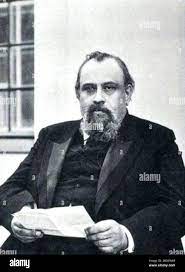Kovalevsky, Maksim

Bio: (1851-1916) Russian sociologist, historian, and jurist. Maksim Kovalevsky studied law at the University of Kharkiv and obtained his doctorate in law at the University of Moscow, where he later began his academic career. He has also lectured in Paris and St. Petersburg and has given many lectures as a visiting professor. He became president of the International Sociological Institute in 1907. At the beginning of his career, he mostly dealt with legal history, and he paid special attention to the situation in England and the Caucasus. After that, he expanded his historical research to other spheres, and the most important books from that period are The Economic Prosperity of Europe until the Emergence of Capitalism (1898-1903) and The Origin of Modern Democracy (1895-1897). Sociology came into the focus of Kovalevsky's interest only in the later phase of his intellectual work. The first book with a sociological theme was Contemporary Sociologists (1905), in which he gave an overview of the most important sociological trends of the time and criticized every form of sociological monism.
In his book Sociology (1910), Kovalevsky presented his sociological position in detail. The book has two volumes, in the first, he presents the method and goal of sociology, as well as the relationship of sociology to other social sciences; while in the second volume, he presents his sociological approach, which he called "genetic sociology". Kovalevsky saw sociology as a general social science that should not borrow its premises from the special social sciences, but should only generalize the data that these special sciences gathered.
Kovalevsky believes that the main law of sociology is the "law of progress". The law of progress says that the "unique history", that various societies have gone through, is a consequence of the progressive evolution of humanity. Progressive evolution is reflected in the fact that when different societies, that are developing independently of each other, reach the same level of political development, they acquire similar characteristics in other spheres (social, economic, mythical-religious, etc.). The task of sociology is to study the collective mentality of society and to determine how it affects social evolution but to also study how that mentality is shaped by social evolution. The goal is to determine the general evolutionary tendencies and causes that lead to stability but also changes in society. His view of the progress of societies does not imply a constant increase in general social welfare or a constant decrease in negative social phenomena.
Sociology should determine the laws of social evolution and define the various evolutionary stages. The best way to arrive at such generalizing theories is by studying the parallel historical development of different societies. For this purpose, Kovalevsky used what he called the "comparative historical method", in which the most important thing is to analyze historiographical and ethnographic data on different societies. In addition to historical analysis, he applies functional analysis to determine whether certain social institutions emerged with a transition to a higher evolutionary stage, or only outlived an earlier stage, and continued to function at a higher stage.
Kovalevsky singled out several evolutionary social stages. The simplest degree is the horde, which is characterized by a matriarchal family. At the next level is the clan society, which has been transformed by taboos and exogamy, while the worship of the ancestors of the institutions has survived the horde period. In the third stage of the "tribe", there is a transition from nomadic to sedentary life, which causes the emergence of large cognate and agnatic families, and later "small families". The fourth degree is feudal, where the functions of ownership over feudal land merge with the performance of public functions. The fifth level is a democracy, where there is political equality and the development of private initiative.
Kovalevsky singled out: demographic, economic, political, ideological, and religious, conflict (internal and external conflicts), as well as social stratification, amount of knowledge, leadership, etc. as the main factors influencing social changes and social evolution and progress. Although demographic factors play the most important role in his theory, especially at lower levels, these factors are less important at higher stages of development, where there is a greater interdependence of all factors. Which factor will be the most pronounced depends on the specific historical development of society, as well as on the specific circumstances that, at some point, affect a society. Leadership that is manifested in individuals with great mental and creative energy and great initiative is also very important because it enables the emergence ("invention") of new forms of behavior, which through imitation and adaptation spread throughout society and turn into social institutions.
Fields of research
Agriculture Anthropology Capitalism Democracy Demography Economy Egalitarianism Ethnicity Evolution Feudalism History Imitation Inequality, Social Law Leaders Matriarchy Politics Psychology Religion TabooTheoretical approaches
Genetic SociologyMain works
История полицейской администрации в английских графствах с древнейших времен до смерти Эдуарда IIIго (1877);
Общинное землевладение, причины, ход и последствия его разложения (1879);
Общественный строй Англии в конце средних веков (1880);
Историко-сравнительный метод в юриспруденции (1880);
Закон и обычай на Кавказе (1887);
Происхождение современной демократии, 4 тома (1895-1897);
Экономический рост Европы до возникновения капиталистического хозяйства, 3 toma (1898-1903);
Экономический строй России (1900);
Этнография и социология (1904);
Современные социологи (1905);
От прямого народоправства к представительному и от патриархальной монархии к парламентаризму, 3 тома (1906);
Социология, 2 тома (1910).
Works translated into English:
Modern Customs and Ancient Laws of Russia; Being the Ichester Lectures for 1889-90 (2010).

